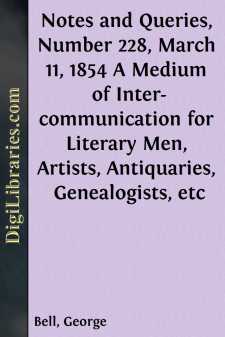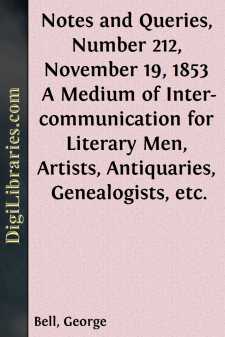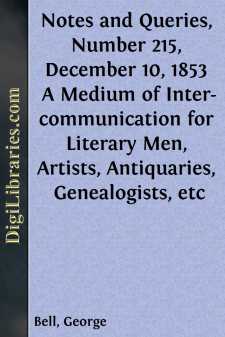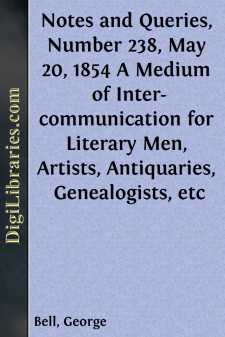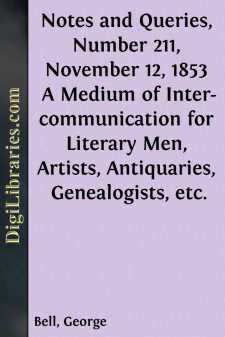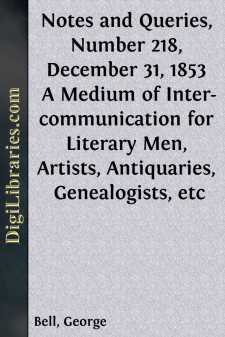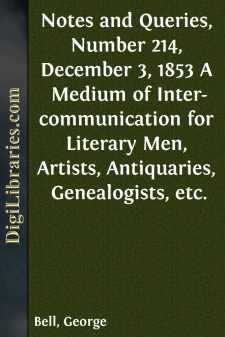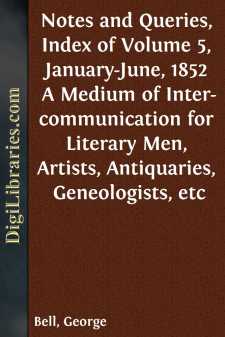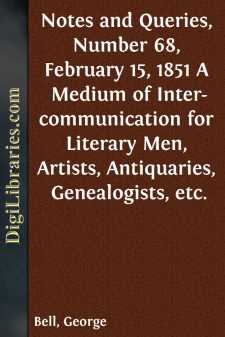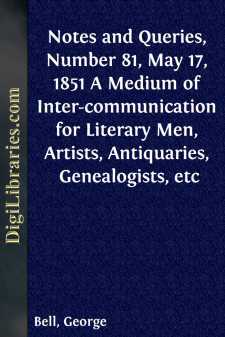Categories
- Antiques & Collectibles 13
- Architecture 36
- Art 48
- Bibles 22
- Biography & Autobiography 813
- Body, Mind & Spirit 142
- Business & Economics 28
- Children's Books 16
- Children's Fiction 13
- Computers 4
- Cooking 94
- Crafts & Hobbies 4
- Drama 346
- Education 46
- Family & Relationships 57
- Fiction 11829
- Games 19
- Gardening 17
- Health & Fitness 34
- History 1377
- House & Home 1
- Humor 147
- Juvenile Fiction 1873
- Juvenile Nonfiction 202
- Language Arts & Disciplines 88
- Law 16
- Literary Collections 686
- Literary Criticism 179
- Mathematics 13
- Medical 41
- Music 40
- Nature 179
- Non-Classifiable 1768
- Performing Arts 7
- Periodicals 1453
- Philosophy 64
- Photography 2
- Poetry 896
- Political Science 203
- Psychology 42
- Reference 154
- Religion 513
- Science 126
- Self-Help 84
- Social Science 81
- Sports & Recreation 34
- Study Aids 3
- Technology & Engineering 59
- Transportation 23
- Travel 463
- True Crime 29
Notes and Queries, Number 181, April 16, 1853 A Medium of Inter-communication for Literary Men, Artists, Antiquaries, Genealogists, etc.
by: George Bell
Categories:
Description:
Excerpt
"THE SHEPHERD OF BANBURY'S WEATHER-RULES."
The Shepherd of Banbury's Rules to judge of the Changes of the Weather, first printed in 1670, was long a favourite book with the country gentleman, the farmer, and the peasant. They were accustomed to regard it with the consideration and confidence which were due to the authority of so experienced a master of the art of prognostication, and dismissing every sceptical thought, received his maxims with the same implicit faith as led them to believe that if their cat chanced to wash her face, rainy weather would be the certain and inevitable result. Moreover, this valuable little manual instructed them how to keep their horses, sheep, and oxen sound, and prescribed cures for them when distempered. No wonder, then, if it has passed through many editions. Yet it has been invariably stated that The Banbury Shepherd in fact had no existence; was purely an imaginary creation; and that the work which passes under his name, "John Claridge," was written by Dr. John Campbell, the Scottish historian, who died in 1775. The statements made in connexion with this book are curious enough; and it is with a view of placing the matter in a clear and correct light that I now trouble you with a Note, which will, I hope, tend to restore to this poor weather-wise old shepherd his long-lost rank and station among the rural authors of England.
I believe that the source of the error is to be traced to the second edition of the Biographia Britannica, in a memoir of Dr. Campbell by Kippis, in which, when enumerating the works of the learned Doctor, Kippis says, "He was also the author of The Shepherd of Banbury's Rules,—a favourite pamphlet with the common people." We next find the book down to Campbell as the "author" in Watt's Bibliotheca Britannica, which is copied both by Chalmers and Lowndes. And so the error has been perpetuated, even up to the time of the publication of a meritorious History of Banbury, by the late Mr. Alfred Beesley, in 1841. This writer thus speaks of the work:
"The far-famed shepherd of Banbury is only an apocryphal personage. In 1744 there was published The Shepherd of Banbury's Rules to judge of the Changes of the Weather, grounded on forty Years' Experience. To which is added, a rational Account of the Causes of such Alterations, the Nature of Wind, Rain, Snow, &c., on the Principles of the Newtonian Philosophy. By John Claridge. London: printed for W. Bickerton, in the Temple Exchange, Fleet Street. Price 1s. The work attracted a large share of public attention, and deserved it. A second edition appeared in 1748.... It is stated in Kippis's Biographia Britannica that, the real author was Dr. John Campbell, a Scotchman."
In 1770 there appeared An Essay on the Weather, with Remarks on "The Shepherd of Banbury's Rules, &c.": by John Mills, Esq., F.R.S. Mr. Mills observes:
"Who the shepherd of Banbury was, we know not; nor indeed have we any proof that the rules called his were penned by a real shepherd. Both these points are, however, immaterial; their truth is their best voucher.......



